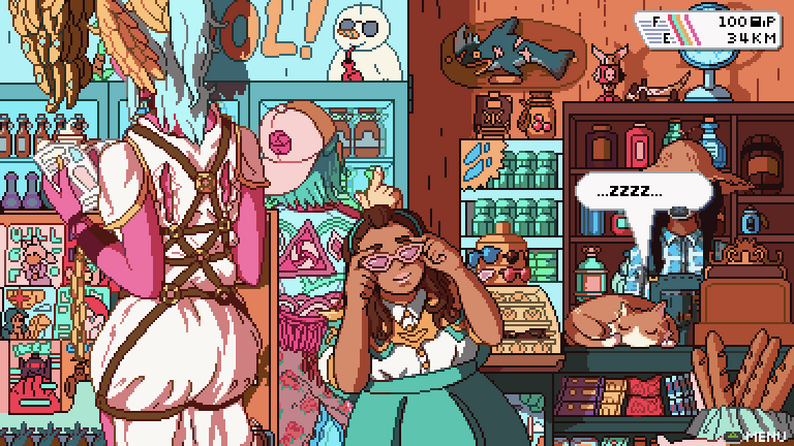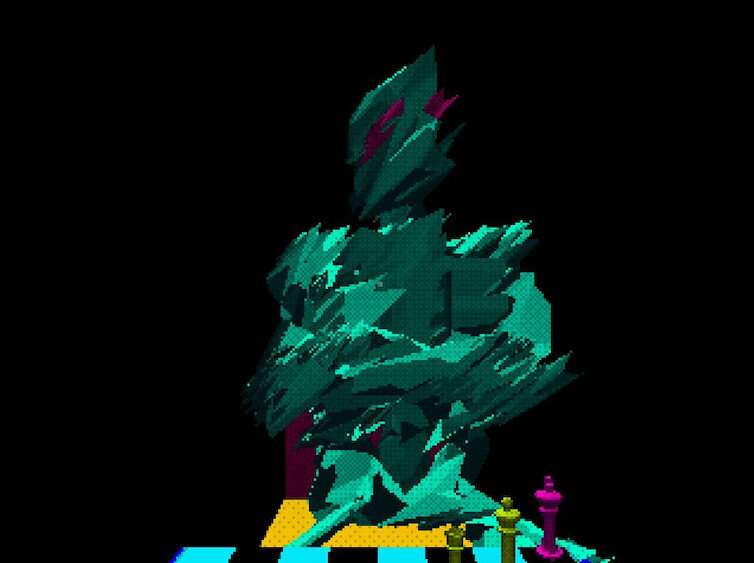6 Games for My Lonely, Queer Heart
By Delaney McCallum
There’s a lot of reasons to feel isolated right now. With the world opening back up again, I find myself in environments that feel like unfamiliar memories. Activities that used to feel mundane, now feel foreign to me - walking into a grocery store makes my palms clammy. Now, when I show my face without a mask, I realize how much my relationship to my sexuality and gender morphed during COVID. Walking out into the real world again and confronting the everyday pressure of gender performance feels like a mammoth task. And on top of all of this, pride month is coming to a close. This brews up a perfect storm for me, a young, OCD-ridden, recently-out-queer, label-confused, gender-disconnected, all-around anxiety ball of a person.
One thing that has helped me massively through all of this? Video games. I have spent many late-night hours discovering some incredibly beautiful pieces of art from indie developers that somehow manage to encapsulate all of my emotions wordlessly. I have whittled down a long list of recommendations to six indie games that have had incredible significance to me. Some of these games are gay, some of them are sad. Some of them are both. All of them, however, have helped me confront some really difficult and emotional questions in the middle of a bewildering world.
So, if you’re like me, and your thoughts have been a continuous cycle of “Am I gay?” “What gender am I?” “Can I go to sleep now?” “What even the fuck is going on all the time?”, then maybe you will find some solace in these six games.
1. Get In the Car, Loser
By LOVE CONQUERS ALL GAMES
Okay, okay, I’m kind of cheating with this one because this game technically hasn’t been released yet. However, it would be a crime for me to not include developer Christine Love on this list. Christine’s Love Conquers All Games has been a wonderful resource for me in times of boredom and romantic confusion. The fun, bright colors and art styles provide a much needed relief, while ushering in opportunities to discuss the complexities of LGBTQ relationships through dialogue and fight options. Love describes Get In the Car, Loser as a “lesbian road trip RPG” about “fighting for love and justice in the face of indifference, and ‘discovering yourself’, whatever the fuck that means.” It features a diverse cast of characters with equipment-based character progression. This is exactly the “disaster lesbian representation we need in 2021.” I can’t wait to channel all of my queer rage into this complex strategy game.
2. Roses
By Chloe Spencer
Roses is the companion game/sequel to Spencer’s award-winning RPG game Grunge. Spencer claims her artistic goal is to increase RPG’s with LGBTQ representation, and she’s doing a great job of it. Grunge is an incredible RPG set in the 90’s that centers on an exciting and terrifying new lesbian romance. I couldn’t recommend this game more, but the gameplay is 10+ hours, while Roses is only 15-20 minutes. I loved Roses because it centers the relationship of two main characters which becomes more complex and intimate in the space of this sequel. The two are forced to navigate their relationship while on a vacation together, after experiencing a traumatic event shortly before. This is the most I’ll say because I don’t want to spoil anything. But I found particular joy in this story because of the lack of violence, the small and intimate scope, and of course, the gayness.
WARNING: parts of this game to spoil details from Grunge.
By Juju Adams, Daniel Marques, Chris Anselmo, and Jan Vorisek
This is not an explicitly queer game. However, it expressed the isolation and difficulty of depression with a nuance and understanding that I have rarely seen in other games. I felt very connected to the story, which follows a character that is trapped in their own mind with no exit. Using simple puzzles, this game effectively expresses difficult feelings that often feel illogical and overwhelming. The graphics are entrancing, and the sound design brings you into an emotional and sometimes overwhelming world. The isolation and confusion I have felt post-COVID is reflected honestly in this game, and I found relief by reading my own queer confusion and depression in it. It’s brief, simple, and will echo in your thoughts for a few days.
4. Welcome to the UnderWhere
By Sean Wejebe
Sean Wejebe is the creator of one of my favorite games of all time, The Longest Couch. Welcome to the UnderWhere, from 2017, holds the same cute cheekiness as his earlier projects. It holds a special spot on my list because it is 2 player (although it can be played alone). I convinced one of my friends to give it a shot with me, and we had a blast. The concept of the game is simple: design some underwear, and walk around while holding hands with a friend. You make the underwear walk around too! It sounds really simple, and it is, which is what makes it so fun and effective. It is gentle, and lovely. It’s a small act of queer physical intimacy - holding hands, while exploring serene environments and designing your own creations. This game created space for joy and light during a rough period for me. I recommend it if you need a smile on your face.
5. Sylvan Song
By Michelle Olson and Sam Celeste
Celeste and Olson are current third year students in the University of Southern California’s Interactive Media and Games Division. They created Sylvan Song together in only two weeks, which is almost unbelievable to me because the game is so solidly beautiful. In Sylvan Song, you play as a white fox roaming through tranquil, picturesque scenery. Poetic text invites you into the game, and introduces you to your objectives. By solving puzzles, you slowly reintroduce color and magic into a dead and blackened world. The game is brief, but incredibly cinematic. I ended up spending a large amount of time just wandering around the magical scenery. Is this game queer? No. But do I find something kind of sapphic, romantic, and nostalgic about running as an elusive white fox and magically restoring magic and color into nature using the power of music? Yes. Maybe that’s just me! Nevertheless, the game is definitely worth a playthrough if you’re looking for some time of relaxation and appreciation for natural beauty.
6. We should talk.
By Kat Aguiar, Nobonita Bhowmik, Francesca Carletto-Leon, Jordan Jones-Brewster, Carol Mertz, and Jack Schlesinger
This game has received a fair amount of publicity and accolades, and rightly so. I still felt it was necessary for me to use it as a conclusion to my list because it is one of the most intimate games I have ever played. Its narrative mechanics manipulate the power of linguistics and sentence structure to uncover the complexities of romantic communication. More than anything, the game feels incredibly realistic. You are forced to find a healthy balance of chatting up people at a bar, while also keeping in contact with your partner at home. Your relationships morph through the night until you reach one of nine possible endings. My favorite aspect of the game is how intentional you have to be with your dialogue choices. The developers elaborate: “The combination of words you choose impacts the conversations you have, how genuinely you can connect with your partner, and whether your relationship can survive the night.” The game relates to all kinds of relationships, romantic, platonic, queer, or straight. During a time when I was deprived of most human interaction, this game helped me explore the intricacies of intimate communication. It tackles nuance and intense emotion. And it gave my lonely queer heart someone to talk to!












